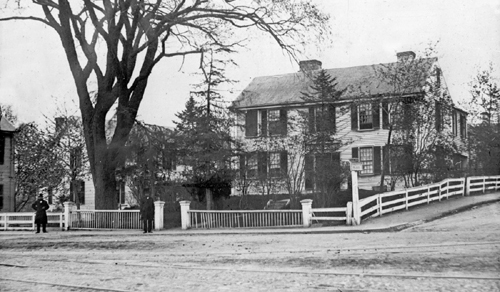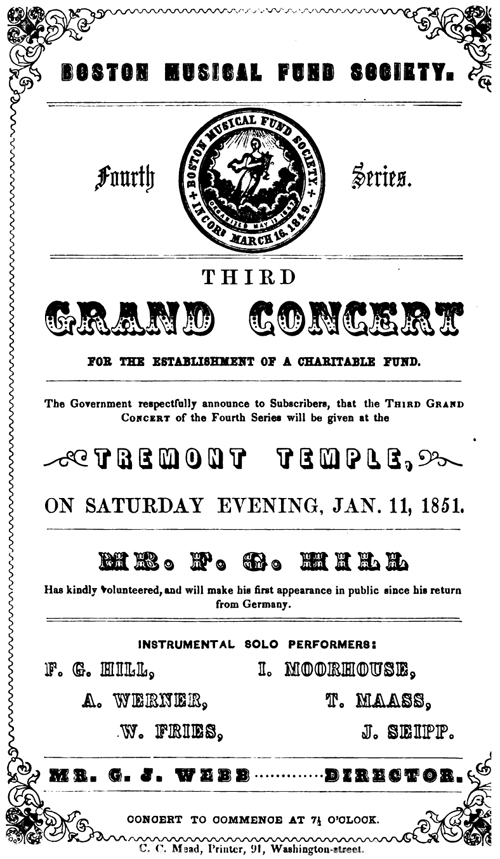A few private mems of M J Wild. p. 1st
Wednes. January 1st 1851
A new year begins and may be the last to some of us. If so, we are commanded to be ready. The weather was fine, C Rhodes![]() had been here on a big visit, about 7 weeks. I followed out my usual round of duties. Edward
had been here on a big visit, about 7 weeks. I followed out my usual round of duties. Edward![]() & Walter
& Walter![]() were at home. I had made a winter cloth sack for Watty the week before & undergarment for self.
were at home. I had made a winter cloth sack for Watty the week before & undergarment for self.
Thurs. 2d.
M. Howe![]() returned from N York. C. Rhodes went to Prov. to stay 3 days.
returned from N York. C. Rhodes went to Prov. to stay 3 days.
Frid. afternoon
Dr. C. Wild went to Prov. Staid one night with M. Cushing![]() – took up a keg of st. pork
– took up a keg of st. pork![]() . Found all well out to my father’s and returned Sat. eve with C.R. I finished a pr. of cot. flan. draws for my son Edward — All troubles & trials at rest now, between him & M. Howe. Heaven be praised, for such an ending. The trio: mother, Frank> & Mary, were never satisfied with anything but themselves. And what they will do without Edward to find fault in, I know not. And care less.
. Found all well out to my father’s and returned Sat. eve with C.R. I finished a pr. of cot. flan. draws for my son Edward — All troubles & trials at rest now, between him & M. Howe. Heaven be praised, for such an ending. The trio: mother, Frank> & Mary, were never satisfied with anything but themselves. And what they will do without Edward to find fault in, I know not. And care less.![]()
Sund. 5th
Extremely cold, so that I could not go to church to [commune?] my eyes pained me very much.
Mond.
Busy as usual. Put down carpet in my chamber, cleaned the parlor cham. and the parlors.
Tues.
Expected A.E. Rhodes would be married and visit me but I received note from M. Cushing saying Eliza was sick.![]() I took cold & had severe influenza, the homeo
I took cold & had severe influenza, the homeo![]() med broke it up in 3 days. Finished cotton flan. draws the second pr., for Edward and altered pr. for self, mended Drs. two frock coats, could not sew much at a time felt sick until Frid. Mr. Knapp
med broke it up in 3 days. Finished cotton flan. draws the second pr., for Edward and altered pr. for self, mended Drs. two frock coats, could not sew much at a time felt sick until Frid. Mr. Knapp![]() called.
called.
Sat.
Bethan D.![]() called I went to the musical Fund
called I went to the musical Fund![]() in the eve with C. Rhodes & Dr. Sen.
in the eve with C. Rhodes & Dr. Sen.![]()
Charles C. Rhodes, 1826-1857, son of Mary's brother Amos. Mary notes his death (p41) and says her husband and daughter, Mary, went to Providence for the funeral.
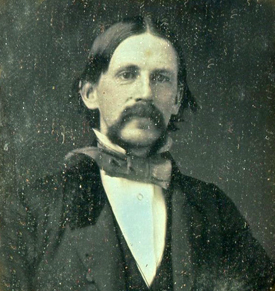
Edward Augustus Wild (1825-1891) was the third oldest of Mary and Charles Wild's six children who survived to adulthood. (Three others died in infancy.) He was a physician who started practice in Brookline with his physician father. Wild was an abolitionist, a Brigadier-General in the Civil War who lost his left arm in the battle of South Mountain and who later commanded an African-American regiment, and a figure known for various foreign escapades. He is referred to in the diary as Edward, E.A., and Dr. Jun. (The latter is for Dr. Junior, as opposed to his father, Dr. Sen.). For a more extensive account of his life see Footnore #7, BROOKLINE IN THE CIVIL WAR
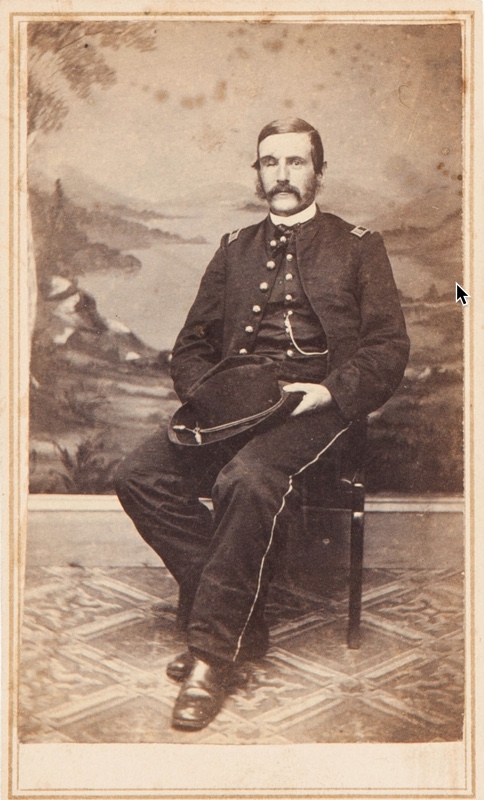
Walter Henry Wild, (1836-1922), the Wilds' youngest surviving child. Known as "Watty"
Mary Heath Howe (1830-1902) lived on Warren St. near the reservoir. Edward Wild and Mary Howe were engaged to be married and appeared to be the "It" couple of the day. He had just returned from various adventures in Europe when the engagement was broken off and it was the talk of the town.
Mary Heath (Wild) Cushing, the Wild's youngest daughter and sixth surviving child. Married to Edward Jarvis Cushing and living in Providence.
Probable meaning
Edward Wild was engaged to Mary Howe, but the engagement was broken off. This acerbic comment refers to Mary, her older brother, Francis Edward Howe, and their mother.
Anna Eliza (Rhodes) Atkinson, (1831-1861), daughter of Mary's brother Edward, was married to John Atkinson in Providence on January 16, 1851. See p4.
Charles Wild practiced homeopathic medicine.
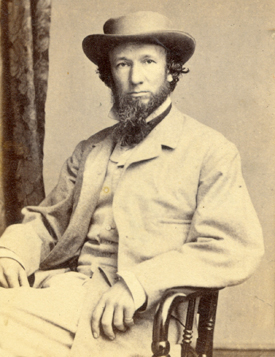
Frederic Knapp (1821-1889) was minister from 1847 to 1855 of the First Parish Church on Walnut St. He graduated from Harvard College in 1843, Harvard Divinity School in 1847, became the junior pastor at the First Parish Church in 1847, and succeeded Rev. John Pierce as pastor in 1849.
Mary sometimes refers to her husband Charles and her son Edward, both doctors, as Dr. Sen. (for Senior) and Dr. Jun. (for Junior).
Elizabeth Ann Davis, (1827-1855). Daughter of Benjamin and Susanna Davis. Her death is noted on p31, she died of consumption at the age of 28 and is buried in the Walnut Street Cemetery. She is also introduced on page 5 in the Adeline Faxon diary. Adeline was a regular visitor to "Lizzie" and the Davis house on the southwest corner of Washington St. and Davis Ave. which looked then much as it does in this circa 1865 photo.
The Society was created in 1847 and incorporated in 1849 for "the advancement of the science and practice of music, and the establishment of a charity fund for the benefit of indigent members of the society, their widows and children...". It was modeled after the nation's first one, created in 1820 in Philadelphia, and sponsored regular concerts for several years.
